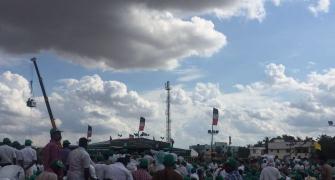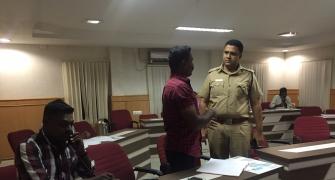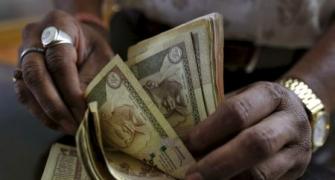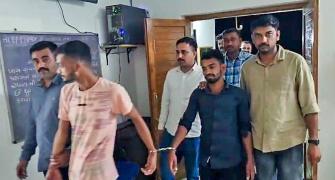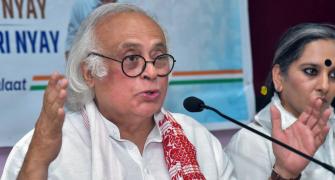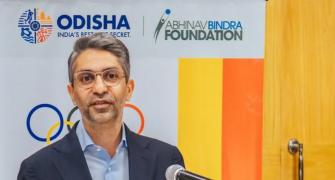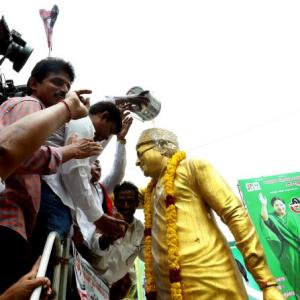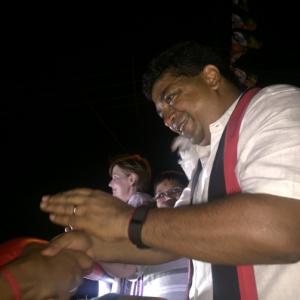'We have about Rs 4 lakh crore debt on a state budget of about Rs 1.5 lakh crore.'
'We are in a debt two-and-a-half times our annual budget,' says the banker who would have been Tamil Nadu's finance minister had the DMK won.
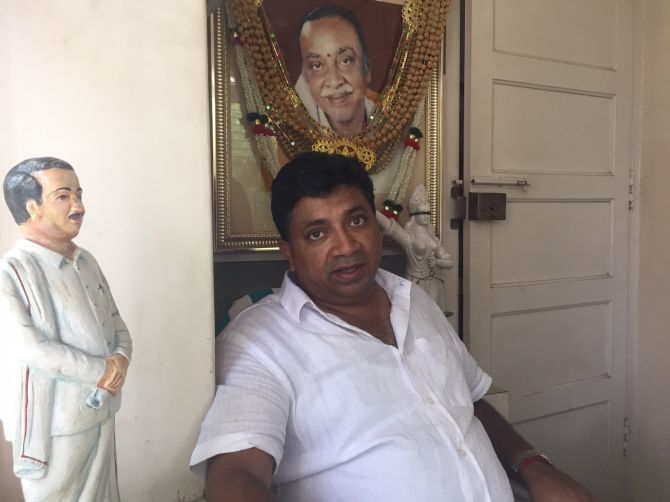
If political pedigree wins elections, Palanivel Thiagarajan, a first-time contestant from the Dravida Munnetra Kazhagam, is a fourth generation politician, following in the footsteps of his grandfather P T Rajan and his father P T R Palanivel Rajan, both legends in Madurai.
But Thiagarajan chose to have a career of his own, after arming himself with a BTech, an MS, a PhD and an MBA, the last three from American universities. When his father passed away in 2006, he was approached by the DMK to fill his shoes, but Thiagarajan declined.
This time round, he felt, the time was right, and the party was still willing and so he contested the election from his father's seat, Madurai Central, which he won after a see-saw battle.
In an extended conversation at his Madurai home on the eve of the election, Dr Thiagarajan told Rediff.com's Saisuresh Sivaswamy and A Ganesh Nadar that the next finance minister of Tamil Nadu has a tough job on his hands.
If you win your maiden election, what will be your first priority?
My first priority is to make the MLA's office functional again. It has been locked up for five years. What is the point of having an MLA's office, how do you reach out to people? It is not practical to first ask votes for respect, and then to thank people you go street to street.
There are 233,000 voters, I can't be realistically going around on the streets every day, I need to have a mechanism for them to have some place to go with their complaints.
As I have said in some interviews, I will have set up a call centre with CRM-linked solutions. So that it tracks every time a constituent calls, I know the history from now on. So, I now know who they are, where they are from, I know what their history is. If they called now, I know they called about water six months ago.
I want to have a physical place where people can come and feel like they are heard. I want to hold office hours like I used to do when I was a lecturer or research assistant, where people can come and see me in person.
I want to set up what a representative's office is supposed to be. The government gives you funds for it, it gives you a building for it, you employ some staff, set up some technology, have a place where people can meet you.
What I have said is that unlike what others have done, I would publish a report every six months. The status report or progress report will be partly about complaints received/resolved, where they are held up, where the bottleneck is, partly about how the progressive vision for a long-term strategy is developed.
I want to have a 10-year plan for infrastructure development.
If I say I will solve the problem today, by definition it will take me three years. If I start digging now, it will take 3 to 5 years to finish building (it). So, this fundamental concept of a plan for 10 or 20 or 50 years from now, is nowhere to be seen. We are executing short-term solutions.
That, to me, is the biggest way I can make a difference. But for that to happen, as I said, all the ducks have to line up.
You are tipped to be the state's finance minister if the DMK comes to power. After all, there is no one more qualified than you for the post.
I haven't had any discussion on this with anyone. I am worried about being an MLA first. Whoever it is, I don't envisage it being an easy job.
The state's finances are in a mess, there are three or four numbers that stick out in my mind.
We have about Rs 4 lakh crore debt on a state budget of about Rs 1.5 lakh crore. So, basically, we are in a debt two-and-a-half times our annual budget.
This is exactly the reason why they would want someone like you as finance minister.
I don't understand how this happens. But I am told the weighted average on this debt is something like 10.1 per cent, which to me is just mind-boggling. It is a negative interest rate.
The world is awash with money. All the central banks are pumping out liquidity as fast as they can. Trillions of dollars are floating in the system. My deposits in Singapore and America are earning me 0 or 0.05 per cent interest.
And here, we have a state with 70-odd million people, great growth prospects, large asset value, paying an average of 10.1 per cent. The Government of India bonds, 10-year bonds, trade at 6 or something like that, 7 maybe.
Something is structurally wrong. Whoever gets it, it's a thankless job. It's not a simple job. So I am not certainly...
There's a saying in Tamil, thondharavai vilai kuduthu vaangaradhu, paying good money to buy trouble, and I am certainly not angling for anything like that.
A report said that most of the candidates fielded by your party and the All India Anna Dravida Munnetra Kazhagam are school dropouts. Then there are you, with a PhD in an arcane subject that very few people would know about.
There's clearly an intellectual chasm between you and the party you represent, aren't you a misfit?
A senior reporter of a national newspaper called me the day the nominations were announced. The DMK had put out a printed notice and she had noticed against my name was written 'BTech (honors), MS, PhD, MBA.' So she called me and said she has been reporting for 16 years, but she has never known anybody with such academic qualifications in politics. I told her are you sure those qualifications are needed for this job?
I don't know whether to be a good politician one requires such high academic qualifications. I personally believe the world has become a complicated place.
My father and grandfather, both were highly educated, sophisticated barristers. My grandfather was called to the bar at the Inner Temple. He could have gone and been an Ethiraj, Mudaliar, or a C P Sundaram or C P Ramaswamy. But he chose to do public service.
My father was as brilliant and as well-accomplished academically as I am. My father was a genius, he was a contemporary of K K Venugopal, he could have been the most brilliant lawyer, made a lot of money, but he gave up that career.
They were qualified in law because at that time, the job of a member of the legislative assembly was to make laws. If you have to legislate, you have to be a lawyer. Lawmaker needed to be someone who understood the law.
Today, I think, the world has changed a lot. Any administrative body, whether it is an MP or an MLA is now a public policy maker. This notion that somehow the civil services, iron frame, steel frame or whatever they are called, are geniuses at administration and politicians are only overseers is a crackpot.
The world is a complicated place. Civil servants, who have limited terms in various offices, may not necessarily be good policy-makers. They are a fundamental component, they are fantastic, we cannot do without them, but that is not sufficient anymore.
For me, if you want to be a policy-maker, if you want to be an administrator, you got to be properly aware of the implications of public policy and decisions on trade or finance or globalisation or infrastructure.
So, I think, it's an increasing trend. I don't think there are as many school dropouts as you say. I think you are exaggerating.
How did a banker, trader, someone as highly qualified as you decide to join politics, and why?
For my whole life I was preparing for this. I am my father's only child, so it was drilled into me from the day I was born that sooner or later, I have to do this.
I just kept trying to push it off as far as possible. Partly, to live my own life and see who I was or what I could be without being my father's son, partly because I am intellectually curious and want to study and want to do a few things.
Partly because I realise that the cost of fame, or the cost of public position in terms of lack of privacy, lack of time, lack of family, would be so high that I was not willing to pay that price till much later in my life.
But some day I was going to do this, the only question was when. When I finally decided to join politics, my wife and some of my close friends said, 'Ah, finally. We've been waiting about this for 30 years so...'
Is it because you are their former minister's son that the party gave you a ticket, or is there something more?
Let me answer that in two ways.
I am not just a minister's son. I am a fourth generation descendant of a family that has contributed to the self-respect movement of the Justice Party. If that is the basis for my right, my right is as strong as anybody's, possibly stronger.
On the other hand, I don't think the party is in the business of finding every fourth generation descendant of a member's family and giving him a seat. So, I think from the party's perspective, I hope it is some combination of my capability and my family's legacy.
From my perspective, I am 100 per cent clear I would not have sacrificed my career, which I have built through decades of hard work and impeccable academic credentials.
I could have 50 different careers, all paying like my last career did, millions of dollars. There is no natural reason for me to want to give up all that to do this if I was not my father's son. I certainly would not have come.
So who in the DMK approached you, and when? Were you initially reluctant? If so, what was the actual trigger point that made you say, damn it, I am going to do this now?
The first approach came when my father died (in 2006). When my father died, the party offered me his seat. At that time, I couldn't take it because my wife was pregnant, and my other son was one year old.
My wife had never lived outside the United States. This was not an easy choice. So I couldn't take it then.
You know, after that there are so many dynamics, there is dynamics in the party, there is dynamics in my life, dynamics in the career, dynamics in the region. For one reason or the other it never quite worked out.
This time, I put in my application. There was no question of anybody approaching me. The party has a very clear process. You have to apply to the party's selection committee first, they call you for an interview, you go through it, and then they decide on the candidature. I went just like everybody else in the party.
Obviously I am on very close personal terms with many people in the party, from the leader (party president M K Karunanidhi) to many people in the hierarchy. But having come from a corporate background, I am a stickler for procedure.
So did you choose the DMK because it was your father's party, or do you sincerely believe in its ideology and programmes? Why not any other party?
I think at the end of the day, I could argue this at a hypothetical level and a practical level.
At the hypothetical level, the DMK, AIADMK, DMDK (Desiya Murpokku Dravida Kazhagam), MDMK (Marumalarchi Dravida Munnetra Kazhagam) are all descendants of the Justice Party.
At some level, the ideals of the Justice Party have driven the self-respect movement or the Dravidian movement, their ethos from that time which was equality, removal of customs that were oppressive to some castes or women, and enlightening people of all kinds.
For me, it was never a question of anybody except the DMK. That's where my father was, that's where I believe the ideals are closest to what was originally the self-respect movement. And to which I had made a commitment. I could not come in 2006, but I told thalaivar, kalaignar (Karunanidhi) that I will come back, you just give me time. So when I came, he gave me this seat.
Tamil Nadu has always seen anti-incumbency. When will we see development-oriented politics? A positive vote?
I now have formed my own theory after having been in the field. I think the people's expectations are so high that they cannot articulate it. They are clearly not well informed because they vote for Rs 500 or Rs 200, but their expectation of what the government ought to do for them are so high that, in my view, the default outcome every five years is, out with the old crooks, at least bring in the other crook.
So the question is no longer whether there people are dissatisfied. In my view, the question is, have I done such an outstanding job that the voters should overlook my limitations, which everybody has, and still give me five more years?
Now I can't say that freely because I am in a contest myself, but if you go back and look at the history of the last 40 years, it has not done the country any good to have one government for 10 years, whether it is at the Centre or state-level. But on the other hand, there are states now where you see governments continuing for 15, 20 years, like Bihar, Gujarat, Assam.
I have had a very detailed discussion with former deputy CM Mr (M K) Stalin. I think that we have it within our grasp that we can change the system, we can, because you cannot reform the administration or government without reforming the party first and I think we have it within our reach that we can fundamentally reform the party under the leadership of Mr Stalin.
To the extent that if we get a chance this time, we can increase significantly the likelihood of being elected the next time.
There are two factors that make you seem a misfit in the party. One, of course, is your over-qualification among your colleagues. The second is that you stick out in a party that was founded on, among many others, distance from religion...
The self-respect movement did not say anything about (being) anti-religious. It said you cannot use religion or religious practices to oppress some people or withhold rights from other people.
Do you think anyone can stop the cash for vote trend in Tamil Nadu?
I have not paid a single rupee. I refuse to pay a single rupee. I had only two discussions about money with my party's senior office-bearers in my constituency. On the first occasion, I said I am not going to pay a single rupee to the voter.
I was pleasantly surprised when the guys started clapping. I asked them why are you so happy, I thought you won't be. They said no no, now we can sleep well at night. If caught with money, you get a one-year imprisonment, you are shamed. It is risky to distribute money among voters.
I might be wrong, but from my perspective, distributing cash to voters is a dying business, not because of morality, but because of practicality. The odds of doing it without getting caught, especially in urban centres, are very less. And let's be realistic, these are people (party workers) who don't see a lot of money. If you start distributing, say, a gold ear-ring, there's a chance that somehow you can see whether the voters are wearing it or not.
But if I distribute 100 rupee notes, how would I know that they have reached the voters?
Let's just do the math. Let's assume 233,000 voters get 200 rupees per vote. That means Rs 4.66 crores (Rs 46.6 million) has to flow from top of the party to the voters. And, at best, you have 20 or 30 people at the top of this distribution system.
At some point, one person may have a packet of Rs 20,000. What if he just puts it in his pocket and walks away, how do you know (he didn't)? This, I am told, is exactly what happened the last time.
Hardly 20 to 50 per cent of the money reached (the voters). And, so, the disenchantment of the 50 to 80 per cent that didn't get the money was worse.
So, in my view, maybe if you are the ruling party and if you have an off-cycle election, like a by-election, maybe the practicalities are still possible. But in a general election, I think the logistics are the biggest problem and people's likelihood of voting for Rs 200 based on the fact that they took money is going down to zero.
I chose to do it (not giving money) for moral reasons. If I win or lose, we will know whether I am right or wrong. But I don't think logistically it's practical anymore.
Is it possible that while you may not countenance it, your party workers may have indulged in it behind your back?
No chance. This is a transparent society. At an investment banker level, when Lehman (Brothers) went bankrupt, others approached me within 24 hours. Some, when I told them I cannot contact them till it was all over, said no problem. Some were very aggressive, saying we need a CEO for our centre so start interviewing tomorrow. So, reluctantly, I started interviewing.
But because I had to go through their offices for video conferencing to Hong Kong or London, other people in those offices would see me and then call their classmates in Lehman and tell them, 'Your boss is here...'
So you know, by the time I had two interviews, everybody in Bombay knew where I was going and what I was going to do.
If this can happens at that level, can you imagine what may happen on the street-level? The chances that the party can do it without my knowledge are exactly zero.
Traditionally, the Madurai belt came under the thrall of the other son in the DMK, M K Azhagiri, who now stands expelled from the party. Does it in any way affect the dynamics within the party for you?
Look, I have answered this question a dozen times already.
But we still have to ask you this, maybe you will tell us something different.
Fair enough, but my answer is still consistent, in the sense that his position in the party is not in my control or grasp or purview, right? I am not a secretary, not a general council member, I don't get to dictate or even vote in the party.
At a personal level, whether he was in or not, he has always had a cordial relationship with me and vice versa.
Your families go back a long way, too.
Yeah, I mean, if you look at the history, there's been mixed periods. But, personally, I have always had a cordial relationship with him. Even before he was MP or a central minister, we shared as cordial relationship as we do now. Whether he is in the party or not is not in my control.
Have you had a word him after your nomination?
I talk to him often, whether before and after my nomination. He comes home on my father's birth and death anniversaries. If I am in town and I have the time, I call on him. It is not a very close or intimate relationship, but it is cordial.
Beyond that, as far as the party is concerned, I am not the right guy to comment.
Just as politics was preordained in your case, is it preordained in your sons' case as well?
I will give you three answers to this very interesting question.
First, I would not want my sons to enter politics without first having a career in some other profession, whatever they choose.
Secondly, I think it's my job to provide a platform for them to come to politics. Even if I think I am particularly well-qualified or global, whatever I may think of myself, I can even argue that I would not have come if I was not my father's son, that's my problem.
The fact is if I had wanted to come, I could not have come if I was not my father's son. It was not like they were giving me the seat just because I sent my CV in. So, to that extent, keeping the option alive for my children is something I want to do.
Third, I think this is deeply personal. If I had only one child, I am not sure I would have continued this tradition because I would have wanted him or her to have a little more freedom. But, now that I have two children, it's easy, as long as one of them takes it by choice, it will be fine.
You've never owned an American passport?
No, I told you my future was always here. I had a Green Card for 15 years and then when I went to Singapore, I gave it up and took permanent residency. Then I gave it up also.
So, basically, I have been fortunate in every way you can think of. And there's no way I would have had that if my father and grandfather had not devoted their lives to public service.
Look at my house, it shocks me when everybody writes palatial house, big manor. Truth is, it's crumbling and falling down.
We are not the people who have taken that much pride in our wealth. I don't drive a fancy car. In that sense, if we had put those kinds of things, if we had been motivated by those kinds of things, I don't think my life would have worked out as well as it did.
I am a wealthy man because I work hard, I am talented, and because the good deeds of my father gave me good luck.
But, in the context of life, I am only a plumber. I am here to fix the platform so my son can be a great man.
So, in that sense, even having this opportunity for me, whether I win or lose, is already a great gift from god because it is the second time I have got this chance.
Whatever happens, happens, right?
IMAGE: PTR Thiagarajan. Photograph: Saisuresh Sivaswamy/Rediff.com

